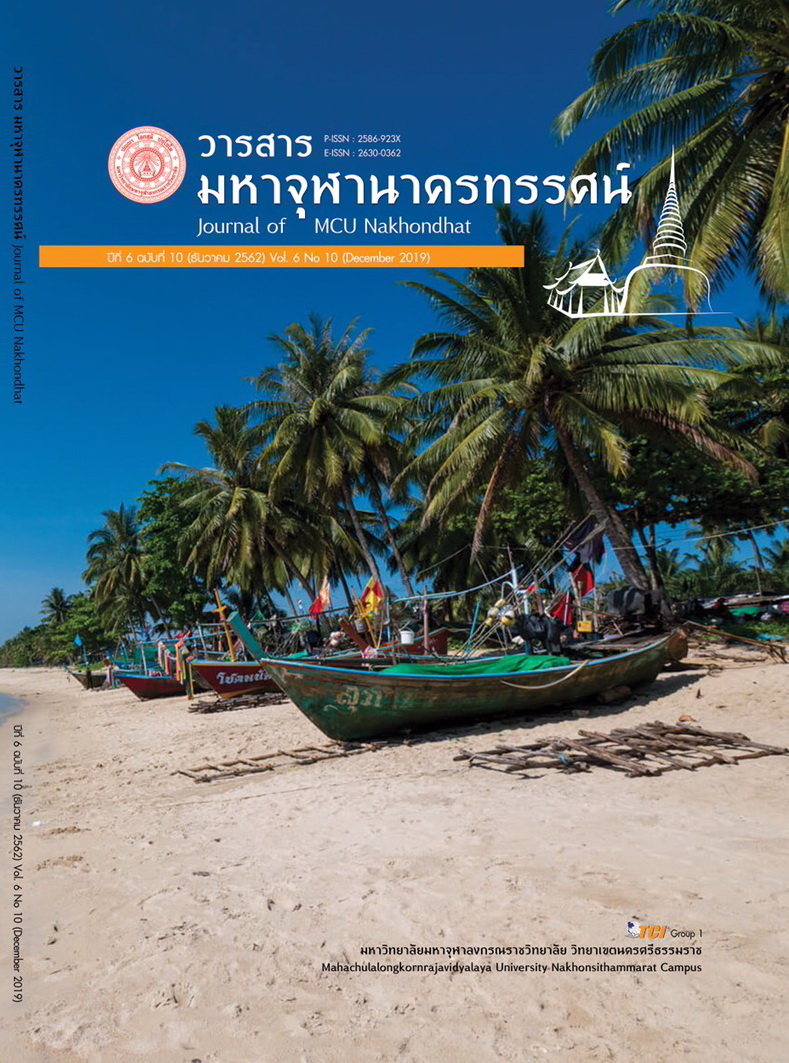GUIDELINES MANAGEMENT FOR GRADUATE STUDIES IN THE 21ST CENTURY
Main Article Content
Abstract
The purpose of this research was to study the guidelines for the management of graduate studies in the 21st century. The samples used in the research were 1) two hundred educational personnel in higher education institutions under the government (Ramkhamhaeng university) received from purposive sampling. 2) Five lecturer in graduate program from Ramkhamhaeng university. And 3) Five graduate experts from Ramkhamhaeng university who were selected by purposive sampling. The instrument used was a 5 level gauge guideline questionnaire with a consistency index of 1.0 and a whole confidence value of 0.948. The statistics used to analyze data were frequency, percentage, mean, standard deviation, and the consistency index. The interview results were analyzed by data classification and data grouping.
The research found that:
The guidelines for the management of graduate studies in the 21st century are in the highest level ( =4.27) and each aspect was at the highest level in all 4 aspect respectively, In technology (
=4.37); Namely 1) using technology to support teaching and learning to facilitate communication, such as social media applications (IOC=0.8) 2) Develop communication infrastructure to support lifelong learning (IOC=0.8) 3) Use technology as a medium for communication between instructors and learners (IOC=0.8) and 4) Build a resource management system for Learning with access to learning anywhere and anytime (IOC=1.0). In political policy (
=4.27) 1) Education should be emphasized on knowledge and expertise in various fields of work (IOC=0.8) 2) There should be a coordination with entrepreneurs to develop skills of graduates (IOC=0.8) 3 ) Information technology should be used to support self-learning (IOC=0.6) and 4) Education management to promote lifelong learning (IOC=0.6) In economics (
=4.24) 1) There should be a support on external research and research funding (IOC=1.0) 2) Focusing on creating innovations that can be used both now and in the future (IOC=1.0) 3) There should be an integration between each field of studies to create innovation or value-added (IOC=0.8) and 4) Reducing learning costs by using the internet support system (IOC=0.6). Social and cultural aspects (
= 4.23) 1) Education should be conducted in accordance with the standard criteria of the curriculum and the professional criteria specified (IOC=1.0) 2) Developing a curriculum that is responsive to the context of Thai society and culture and world society (IOC=0.6) 3) Integrating society and culture with teaching by encouraging various activities (IOC=1.0) and 4) Promoting learning different languages and cultures (IOC=0.8).
Article Details
References
ประดิษฐ์ มีสุข และทรงธรรม ธีระกุล. (2551). มหาวิทยาลัยทักษิณกับทางแก้วิกฤตของชาติ. หนังสืองานทักษิณวิชาการ’ 51. ใน เอกสารการประชุมโครงการทักษิณวิชาการ มหาวิทยาลัยทักษิณ วิทยาเขตสงขลา ระหว่างวันที่ 16–19 สิงหาคม 2551. มหาวิทยาลัยทักษิณ วิทยาเขตสงขลา.
ไพฑูรย์ สินลารัตน์ และคณะ. (2552). กลยุทธ์การขับเคลื่อนนวัตกรรมการเปลี่ยนผ่านการศึกษา“สัตตศิลา” สู่โรงเรียน. กรุงเทพมหานคร: พริกหวานกราฟฟิค.
มารศรี แนวจำปา และคณะ. (2561). แนวทางการพัฒนาการเรียนรู้ในศตวรรษที่ 21 ของนักศึกษามหาวิทยาลัยราชภัฏอุบลราชธานี. วารสารศรีวนาลัยวิจัย, 8(2), 109-116.
ลูกขวัญ อินทร์คล้าย และคณะ. (2558). แนวทางการพัฒนากระบวนการพัฒนาหลักสูตรของมหาวิทยาลัยราชภัฏพิบูลสงคราม ตามกรอบมาตรฐานคุณวุฒิระดับอุดมศึกษาแห่งชาติ พ.ศ. 2552 และเกณฑ์มาตรฐานหลักสูตรระดับอุดมศึกษา พ.ศ. 2558. ใน เอกสารการประชุมสัมมนาวิชาการ (Proceedings) การนำเสนอผลงานวิจัยระดับชาติ เครือข่ายบัณฑิตศึกษา มหาวิทยาลัยราชภัฏภาคเหนือ ครั้งที่ 17. มหาวิทยาลัยราชภัฏพิบูลสงคราม.
สถาบันอนาคตศึกษาเพื่อการพัฒนา (ไอเอฟดี). (2550). วิเคราะห์ 5 ปัจจัยภายนอกที่มีผลต่อการศึกษาไทย. เรียกใช้เมื่อ 13 สิงหาคม 2562 จาก http://www.kriengsak.com /node/1040
สัญชัย จิตต์ภักดี และคณะ. (2553). ปัจจัยส่วนประสมการตลาดบริการ ที่มีผลต่อการเลือกผู้รับเหมา ของผู้บริโภคในการสร้างบ้าน ในอำเภอเมืองเชียงราย. ใน รายงานการวิจัย. มหาวิทยาลัยเชียงใหม่.
สุทธิพร จิตต์มิตรภาพ. (2553). การเปลี่ยนแปลงโลกของการเรียนรู้ในศตวรรษที่ 21 และการพัฒนาสู่ “ครูมืออาชีพ”. กรุงเทพมหานคร: กระทรวงศึกษาธิการ สำนักงานคณะกรรมการการอุดมศึกษา.
สุพรรณี ชะโลธร และเกษมวัฒน์ เปรมกมล. (2553). หนังสือเรียนรายวิชาพื้นฐานประวัติศาสตร์ ชั้นมัธยม - ศึกษาปีที่ 4 - 6. กรุงเทพมหานคร: สำนักพิมพ์ประสานมิตร.
อุทัย ดุลยเกษม. (2557). แนวทางพัฒนาคุณภาพการจัดการศึกษาระดับบัณฑิตศึกษา. JOURNAL OF SOUTHERN TECHNOLOGY, 7(1), 93-98.
Cronbach L. J. (1997). Educational Psychology. New York: Harcourt Brace Jovanovich.
Jonathan B. & Sams A. (2012). Flip your classroom: Reach every student in every class every day. Washington DC: International Society for Technology in Education.
Mehrens W. A. & Lehmann I. J. (1991). Measurement and Evaluation in Education and Psychology (4th ed.). New York: Holt Rinehart and Winston.
Sternberg R. J. (1985). Beyond I.Q.: A Triarchich Theory of Human Intelligence. New York: ambridge University Press.

